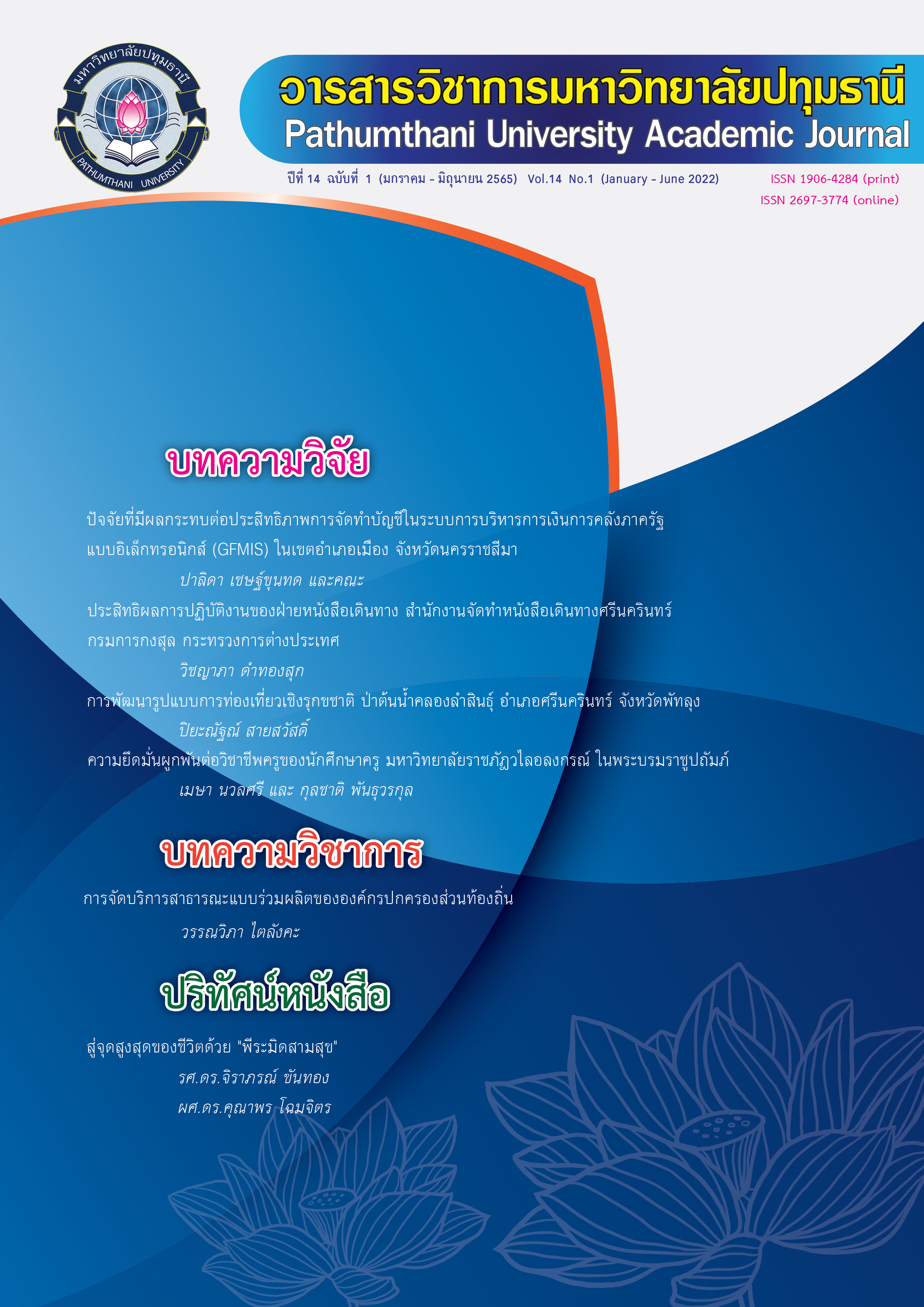PROBLEMS WITH THE CONTROL OF THE ARRESTED PERSONS IN NARCOTICS CASES
Keywords:
Right prevention , controlling of the arrested persons in narcotics cases, exercising the power of officialsAbstract
This research entitled “Problems with the Control of the Arrested Persons in Narcotics Cases” is according to the Prevention and Suppression of Narcotics Act B.E. 2519 (1976) with purposes as; to study laws related to prevent the accused in Thailand, to study problems caused from exercising the power of officials to treat the accused in narcotics cases and to search guidelines for solving problems and amending related laws.
The research reveals that officials have their authorities, as same as inquiry officials in the Criminal Procedure Code to control the arrested persons who offend against the narcotics law, to investigate them for not more than 3 days but there is not any process of investigation on such exercising the power of officials. This is not in conform with Paragraph 3 of Article 9 of the Universal Declaration of Human Rights enacted that “Anyone arrested or detained on a criminal charge shall be brought promptly before a judge or other officer authorized by law to exercise judicial power and shall be entitled to trial within a reasonable time or to release”. Moreover, unnecessary and improper control of the arrested persons is illegitimate with the limitation of personal rights and liberties as stipulated in the Law of Habeas Corpus.
The researchers have suggestions as follows; the law should be amended on exercising the power of officials on controlling of the arrested persons in narcotics cases for being in line with the Universal Declaration of Human Rights. Meanwhile, the investigation system on exercising such power shall be distinctly established more than before. In the name of justice, this is for the arrested persons in narcotics cases to be conformed with principles of criminal prosecution.
References
กุลพล พลวัน. (2538). พัฒนาการสิทธิมนุษยชน. (พิมพ์ครั้งที่ 3). กรุงเทพมหานคร : สำนักพิมพ์วิญญูชน.
คณิต ณ นคร. (2548). นิติธรรมอำพรางในนิติศาสตร์ไทย. กรุงเทพมหานคร : สำนักพิมพ์วิญญูชน.
เชิดชู รักตะบุตร. (2561). “การคุ้มครองและจำกัดสิทธิเสรีภาพของปัจเจกบุคคลในประเทศไทย ในสถานการณ์ฉุกเฉิน ข้อ 4 แห่งกติการะหว่างประเทศ ว่าด้วยสิทธิพลเมืองและสิทธิทางการเมือง ค.ศ. 1966”. วารสารศาลรัฐธรรมนูญ. ปีที่ 20 ฉบับที่ 59 (พฤษภาคม- สิงหาคม).
เดือน บุนนาค. (2520). “การแยกอำนาจ”. วารสารนิติศาสตร์. ปีที่ 9 ฉบับที่ 3.
ธรรมนิตย์ วิชญเนตินัย. (2505). “Habeas Corpus”. ดุลพาห. ปีที่ 9 เล่มที่ 6.
บุญร่วม เทียมจันทร์ และ ศรัญญา วิชชาธรรม. (2563). รวมกฎหมายยาเสพติด และพระราชบัญญัติยาเสพติดให้โทษ พร้อมหัวข้อเรื่องมาตราสำคัญ ฉบับสมบูรณ์. กรุงเทพมหานคร : สำนักพิมพ์ THE LAW GROUP.
ปกป้อง ศรีสนิท. (2564). “สิทธิของผู้ต้องขังในกระบวนการยุติธรรม”. วารสารกฎหมายสิทธิมนุษยชน. ปีที่ 2 ฉบับที่ 1 (มกราคม-มิถุนายน).
ประธาน วัฒนพานิช. (2520). “ระบบความยุติธรรมทางอาญา : แนวความคิดเกี่ยวกับการควบคุมอาชญากรรมและกระบวนการนิติธรรม”. วารสารนิติศาสตร์. ปีที่ 9 ฉบับที่ 2. (กันยายน-พฤศจิกายน).
พระราชบัญญัติป้องกันและปราบปรามยาเสพติด พ.ศ. 2519
มยุรา วิมลโลหการ. (2553). การแสวงหาพยานหลักฐานในคดียาเสพติดโดยการใช้เทคนิคการสืบสวนสอบสวนพิเศษ. วิทยานิพนธ์ปริญญานิติศาสตรมหาบัณฑิต. มหาวิทยาลัยธรรมศาสตร์.
มานิตย์ จุมปา. (2563). กฎหมายรัฐธรรมนูญ ตามรัฐธรรมนูญแห่งราชอาณาจักรไทย.กรุงเทพมหานคร : สำนักอบรมศึกษากฎหมายแห่งเนติบัณฑิตยสภา.
รัฐธรรมนูญแห่งราชอาณาจักรไทย พุทธศักราช 2560
สุรศักดิ์ ลิขสิทธิ์วัฒนกุล และคณะ. (2547). โครงการศึกษาวิจัยเรื่องกฎหมายด้านการคุ้มครองสิทธิและเสรีภาพในกระบวนการยุติธรรมที่ไม่สอดคล้องกับหลักสิทธิพื้นฐานและพันธกรณีระหว่างประเทศรวมทั้งรัฐธรรมนูญแห่งราชอาณาจักรไทย พ.ศ. 2540. กรมคุ้มครองสิทธิและเสรีภาพ.
สุรศักดิ์ ลิขสิทธิ์วัฒนกุล. (2563). ประมวลกฎหมายวิธีพิจารณาความอาญา ฉบับอ้างอิง. (พิมพ์ครั้งที่ 21). กรุงเทพมหานคร : สำนักพิมพ์วิญญูชน.
สิทธิมนุษยชน. (2564). กติการะหว่างประเทศว่าด้วยสิทธิพลเมืองและสิทธิทางการเมือง. [ออนไลน์]. เข้าถึงได้จาก https://humanrights.mfa.go.th/th/humanrights/obligation/international-human-rights-mechanism/ICCPR.php
Herbert Packer. (1968). The Limit of the Criminal Sanction. California: Stanford University Press.
Downloads
Published
How to Cite
Issue
Section
License
Copyright (c) 2022 เมธาพร กาญจนเตชะ

This work is licensed under a Creative Commons Attribution-NonCommercial-NoDerivatives 4.0 International License.
บทความที่ได้รับการตีพิมพ์เป็นลิขสิทธิ์ของวารสารมหาวิทยาลัยปทุมธานี
ข้อความที่ปรากฎในบทความแต่ละเรื่อง เป็นความคิดเห็นส่วนตัวของผู้เขียน กองบรรณาธิการไม่จำเป็นต้องเห็นด้วยเสมอไป และไม่มีส่วนรับผิดชอบใด ๆ ถือเป็นความรับผิดชอบของผู้เขียนแต่เพียงผู้เดียว



